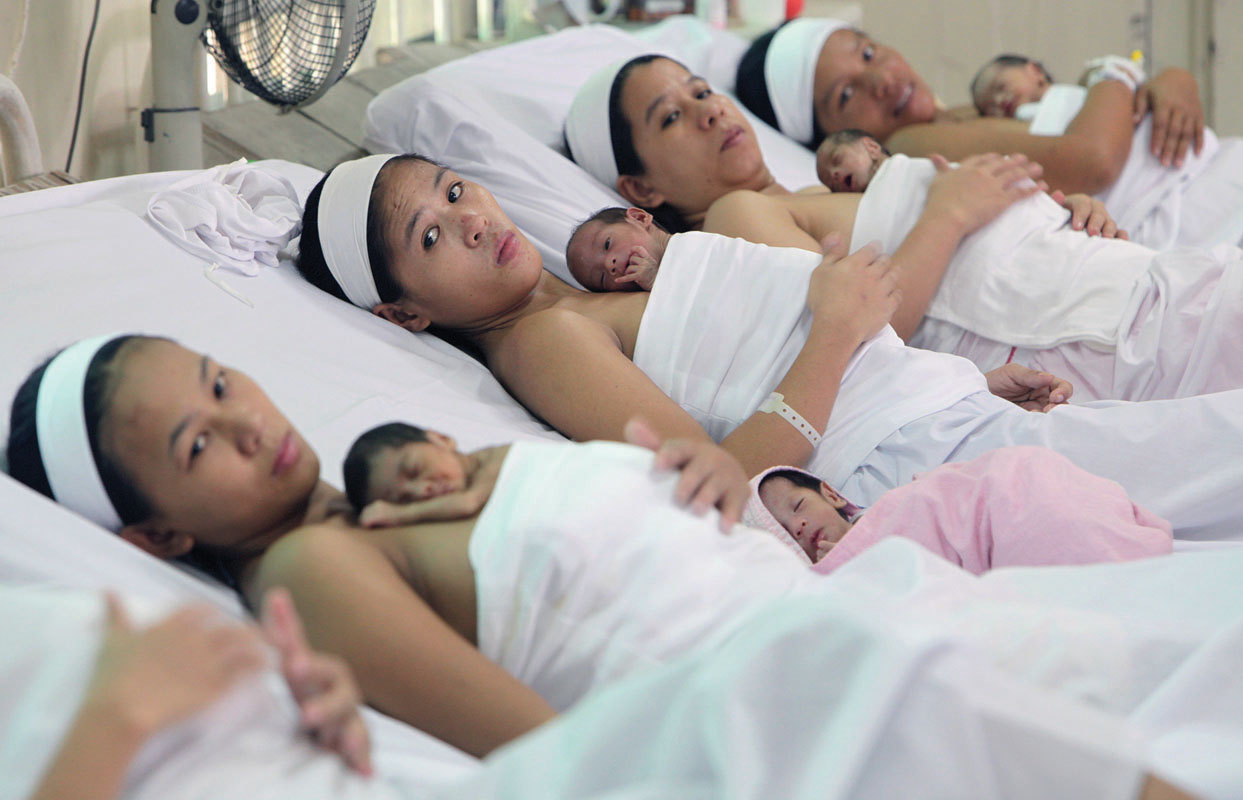 The New Family
The New Family
Humans are social creatures, seeking interaction with their families and their societies. We have already seen how crucial social support is during pregnancy; social interaction may become even more important once the child is born.
The Newborn
Before birth, developing humans already affect their families through fetal movements and hormones that trigger maternal nurturance (food aversions, increased sleep, and more). At birth, a newborn’s appearance (big hairless head, tiny feet, and so on) stirs the human heart, as becomes evident in adults’ brain activity and heart rate. Fathers are often enraptured by their scraggly newborn and protective of the exhausted mothers, who may appreciate their husbands more than before, for hormonal as well as practical reasons.
Brazelton Neonatal Behavioral Assessment Scale (NBAS) A test often administered to newborns that measures responsiveness and records 46 behaviors, including 20 reflexes.
Newborns are responsive social creatures in the first hours of life (Zeifman, 2013). They listen, stare, cry, stop crying, and cuddle. In the first day or two a professional might administer the Brazelton Neonatal Behavioral Assessment Scale (NBAS), which records 46 behaviors, including 20 reflexes. Parents watching this assessment are amazed at the newborn’s responses—
reflex An unlearned, involuntary action or movement in response to a stimulus. A reflex occurs without conscious thought.
Technically, a reflex is an involuntary response to a particular stimulus. That definition makes reflexes seem automatic, with the person having no role. Actually, the strength of reflexes varies from one newborn to the next, an early indication that each person is unique. Humans of every age instinctively protect themselves (the eye blink is an example). Newborns do this also, with three sets of reflexes. (See Visualizing Development, p. 118.)
- Reflexes that maintain oxygen supply. The breathing reflex begins even before the umbilical cord, with its supply of oxygen, is cut. Additional reflexes that maintain oxygen are reflexive hiccups and sneezes, as well as thrashing (moving the arms and legs about) to escape something that covers the face.
- Reflexes that maintain constant body temperature. When infants are cold, they cry, shiver, and tuck their legs close to their bodies. When they are hot, they try to push away blankets and then stay still.
- Reflexes that manage feeding. The sucking reflex causes newborns to suck anything that touches their lips—
fingers, toes, blankets, and rattles, as well as natural and artificial nipples of various textures and shapes. In the rooting reflex, babies turn their mouths toward anything that brushes against their cheeks— a reflexive search for a nipple— and start to suck. Swallowing also aids feeding, as does crying when the stomach is empty and spitting up when too much is swallowed quickly.
Especially for Scientists Research with animals can benefit people, but it is sometimes wrongly used to support conclusions about people. When does that happen?
Response for Scientists: Animal research should not, by itself, confirm an assertion that has popular appeal but no scientific evidence. This occurred in the social construction that physical contact was crucial for parent-
Other reflexes are not necessary for survival but signify the state of brain and body functions. Among them are the:
- Babinski reflex. When a newborn’s feet are stroked, the toes fan upward.
- Stepping reflex. When newborns are held upright, feet touching a flat surface, they move their legs as if to walk.
- Swimming reflex. When held horizontally on their stomachs, newborns stretch out their arms and legs.
- Palmar grasping reflex. When something touches newborns’ palms, they grip it tightly.
- Moro reflex. When someone bangs on the table they are lying on, newborns fling their arms outward and then bring them together on their chests, crying with wide-
open eyes.
These reflexes are responses to experiences, not unlike an adult’s sudden fear, or lust, or anger.
The senses are also responsive: New babies listen more to voices than to traffic, for instance. Thus, in many ways newborns connect with the people of their world, who are predisposed to respond (Zeifman, 2013). If the baby performing these actions on the Brazelton NBAS were your own, you would be proud and amazed; that is part of being human.
New Fathers
Especially for Nurses in Obstetrics Can the father be of any practical help in the birth process?
Response for Nurses in Obstetrics: Usually not, unless he is experienced, well taught, or has expert guidance. But his presence provides emotional support for the woman, which makes the birth process easier and healthier for mother and baby.
As we have seen, fathers-
Being There
At birth, the father’s presence reduces complications, in part because he reassures his wife. I observed this with my own daughter, whose anxiety rose when the doctor and midwife discussed a possible cesarean without asking her opinion. Her husband told her, “All you need to do is relax between contractions and push when a contraction comes. I will do the rest.” She listened. He did. No cesarean.
Whether or not he is present at the birth, the father’s legal acceptance of the birth is important to mother and newborn. A study of all live single births in Milwaukee from 1993 to 2006 (151,869 babies!) found that complications correlated with several expected variables (e.g., maternal cigarette smoking) and one unexpected one—
VISUALIZING DEVELOPMENT
A Healthy Newborn
Just moments after birth, babies are administered their very first test. The APGAR score is an assessement tool used by doctors and nurses to determine whether a newborn requires any medical intervention. It tests five specific criteria of health, and the medical professional assigns a score of 0, 1, or 2 for each category. A perfect score of 10 is rare—

SOURCE: CENTER IMAGE SEKUNDATOR/SHUTTERSTOCK
REFLEXES IN INFANTS
Never underestimate the power of a reflex. For developmentalists, newborn reflexes are mechanism for survival, indicators of brain maturation, and vestiges of evolutionary history. For parents, they are mostly delightful and sometimes amazing.

PETIT FORMAT/PHOTO RESEARCHERS
JENNIE WOODCOCK; REFLECTIONS PHOTOLIBRARY/CORBIS
Currently, about half of all U.S. women are not married when their baby is born (U.S. Bureau of the Census, 2010), but fathers may still be on the birth certificate. When fathers acknowledge their role, birth is better for mother and child.
Couvade
Fathers may experience pregnancy and birth biologically, not just psychologically. For example, levels of the stress hormone cortisol correlate between expectant fathers and mothers, probably because they make each other anxious or relaxed (Berg & Wynne-
couvade Symptoms of pregnancy and birth experienced by fathers.
Paternal experiences of pregnancy and birth are called couvade; they are expected in some cultures, a normal variation in many, and considered pathological in others (M. Sloan, 2009). In developed nations, couvade is unnoticed and unstudied, but many fathers are intensely involved with the early development of their future child (Brennan et al., 2007).
New Mothers
postpartum depression A new mother’s feelings of inadequacy and sadness in the days and weeks after giving birth.
About half of all women experience physical problems soon after birth, such as healing from a c-
With postpartum depression, baby care (feeding, diapering, bathing) feels very burdensome. The newborn cry may not compel the mother to carry and nurse her infant. Instead, the mother may have thoughts of neglecting or abusing the infant, a thought so terrifying that she is afraid of herself.
The first sign that something is amiss may be euphoria after birth. A new mother may be unable to sleep, or stop talking, or push aside irrational worries. Some of this behavior is normal, but family members and medical personnel need to be alert to the mother’s emotions. After the initial high, severe depression may set in, with a long-
From a developmental perspective, some causes of postpartum depression (such as financial stress) predate the pregnancy; others (such as marital problems) occur during pregnancy; others correlate with birth (especially if the mother is alone and imagined a different birth than actually occurred); and still others are specific to the particular infant (such as health, feeding, or sleeping problems). Successful breast-
Parental Alliance
Remember John and Martha, the young couple whose amniocentesis revealed that their fetus had trisomy-
“Scared of what?” he said. “Of a little baby who’s not as perfect as you think he ought to be?”
“I didn’t say I wanted him to be perfect,” I said. “I just want him to be normal. That’s all I want. Just normal.”
“That is total bullshit…. You don’t want this baby to be normal. You’d throw him in a dumpster if he just turned out to be normal. What you really want is for him to be superhuman.”
“For your information,” I said in my most acid tone, “I was the one who decided to keep this baby, even though he’s got Down’s. You were the one who wanted to throw him in a dumpster.”
“How would you know?” John’s voice was still gaining volume. “You never asked me what I wanted, did you? No. You never even asked me.”
[Beck, 1999, p. 255]
This episode ended well, with a long, warm, and honest conversation between the two prospective parents. Each learned what their fetus meant to the other, a taboo topic until that night. Adam, their future son, became an important part of their relationship.
parental alliance Cooperation between a mother and a father based on their mutual commitment to their children. In a parental alliance, the parents support each other in their shared parental roles.
Their lack of communication up to this point, and the sudden eruption of unexpressed emotions, is not unusual, because pregnancy itself raises memories from childhood and fears about the future. Yet honest and intimate communication is crucial throughout pregnancy, birth, and child rearing. Such early communication between new parents helps to form a parental alliance, a commitment by both parents to cooperate in raising their child.
The parental alliance is especially beneficial when the infant is physically vulnerable, such as having a low birthweight. The converse is also true: Family conflict when a newborn needs extra care increases the risk of child maladjustment and parental divorce (Whiteside-
Bonding
parent-
To what extent are the first hours after birth crucial for the parent–

However, the hypothesis that early skin-
This finding does not contradict the generalization that prospective parents’ active involvement in pregnancy, birth, and care of the newborn benefits all three. Factors that encourage parents (biological or adoptive) to nurture their newborns may have lifelong benefits, as has been proven with mice, monkeys, and humans (Champagne & Curley, 2010).
kangaroo care A form of newborn care in which mothers (and sometimes fathers) rest their babies on their naked chests, like kangaroo mothers that carry their immature newborns in a pouch on their abdomen.
The role of early contact has become apparent with kangaroo care, in which the newborn lies between the mother’s breasts, skin-
Kangaroo care benefits babies, not only in the hospital but months later, either because of improved infant adjustment to life outside the womb or because of increased parental sensitivity and effectiveness. Which of these two is the explanation? Probably both.
Implementation of many strategies, especially for fragile infants and their parents, is especially needed in developing nations, where kangaroo care and other measures could reduce deaths by 20 to 40 percent (Bhutta et al., 2008). From a developmental perspective, the most difficult time for high-
SUMMING UP
Every member of the new family contributes to their shared connection, enabling them all to thrive. The new baby has responsive senses and many reflexes. Close observation and reflection reveal how much the new baby can do. The father’s support may be crucial for a healthy, happy newborn and mother. Postpartum depression is not rare; factors before and after birth affect how serious and long-